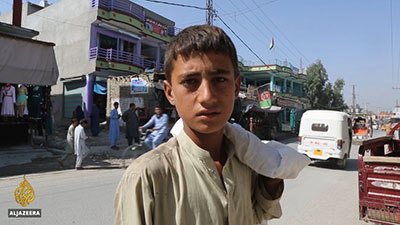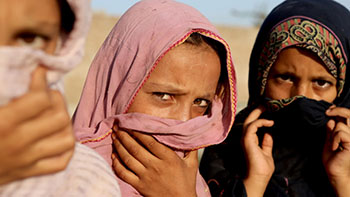By Preethi Nallu

Khudai Nazar has been providing for his five sisters and ailing mother since the killing of his father. (Photo: Preethi Nallu/Al Jazeera)
Confronted with a seemingly innocuous question about what he remembers of his deceased father, 14-year-old Khudai Nazar flinched as tears began to stream down his face, betraying his otherwise calm demeanour.
It was the straw that broke the camel's back. Startled by his own reaction, the teenager tried to shield his grief by lowering his head onto his forearms. We turned off the camera, but the microphone pinned to his collar continued to capture his subdued gasps for breath.
"We told [the armed men] he was just an ordinary farmer, but they did not listen to us and took my father with them," Khudai Nazar, who became the default head of his family at a tender age, explained about the attack by the Islamic State of Iraq and the Levant's Afghan affiliate.
Behind the veneer of his expected role as the "man" of the house, the vulnerability and raw pain of loss and trauma became apparent within seconds of the conversation about his father. For the remainder of the interview, Khudai Nazar remained misty-eyed but determined to explain his daily struggles as an underage IDP (internally displaced person).
Al Jazeera met the family in November 2017, a couple of months after they fled their ancestral village in the Kot district of Nangarhar. Norwegian Refugee Council staff facilitated access to the family, who were living in a makeshift shelter on an empty plot of land in the middle of the city. The family feared that they would be evicted soon due to construction.
"They shot my father in the middle of his field, while we were just left standing," said Khudai Nazar, describing the jolting attack. The entire family fled to avoid further attacks and forceful recruitment by non-state armed groups. The US Department of Defense listed over "20 terrorist groups," - non-state armed actors - including the Taliban, that hold sway over 40 percent the country, according to the latest Pentagon reports. ISIL has been expanding its reach over the past year, while al-Qaeda-affiliated groups are reinventing their identities amid the chaos.
The group was "armed to the teeth," said his mother, Zarmina, and "forcibly recruiting men and boys," and intimidating entire communities with summary executions. Her husband was "a pawn", according to the widow, who suffers from rheumatism but cannot get any medicine. With little support from the UN or the government, she has relied on her oldest child to provide for the family.
Khudai Nazar and his family's experience resonates with at least 75 percent of IDPs in Afghanistan, according to the latest report by the NRC and Samuel Hall that surveyed IDPs and returning refugees in different parts of the country.
The total number of IDPs in Afghanistan was estimated at over 1.5 million at the end of 2016, according to the International Displacement Monitoring Centre, which also participated in the report. The number is a three-fold increase from 2012 and continues unabated amid renewed conflict. Over 653,000 were internally displaced in 2016 alone.

Khudai Nazar and his siblings have not attended school. (Photo: Preethi Nallu/Al Jazeera)
Since his escape with his family in the fall of 2017, Khudai Nazar has been providing for his five sisters and ailing mother. They came to Jalalabad, the closest urban centre, in search of safety and a new start. The untimely death of his father has "transformed" the child, according to his mother. While proud to see her son take on the onerous responsibility of providing for the family with utmost grace and patience, Zarmina worried about his "quickly disappearing childhood." So far, Khudai Nazar and his siblings have not attended school.
"I registered one of my girls in school [in Jalalabad], but they [other kids] fought with her and took her books and school items. We had no one to look out for her when at school, so she stopped going," explained Zarmina.
One of the key findings of the NRC report shows that such concerns are prevalent among IDP families, who get little protection under international laws. A majority of the interviewees reported "harassment, abuse and poor quality schooling as barriers," with added concerns about the safety of their children on their way to school. The recent spate of violent attacks in Jalalabad - including the latest ISIL-claimed attacks against the Save the Children Office that cost nine lives - confirm their fears.
Amid chronic conflict and several waves of displacement, such experiences of daily threats have become an entrenched reality for generations of children in Afghanistan. The majority is in dire need of psychosocial support and rehabilitation, according to Samuel Hall cofounder and lead researcher of the report, Nassim Majidi. The report also warns of increased child labour and an extreme dearth of child protection among IDP communities. Almost one in five of the families surveyed for the study said they relied on child labour to help meet their basic needs.
The frequent nightmares that Khudai Nazar experiences are just one symptom of a much deeper trauma. It will take at least the basics - decent shelter, warm clothes, sufficient food and schooling - for him to even begin reconciling with his grief.



